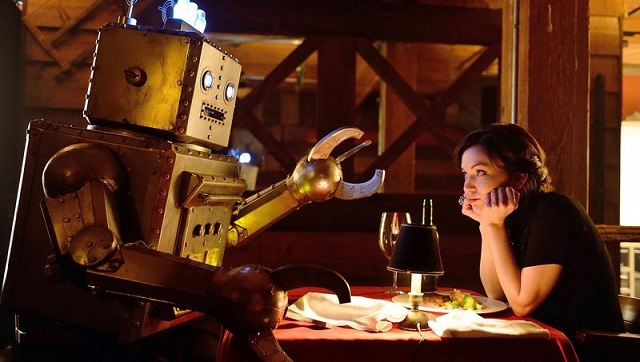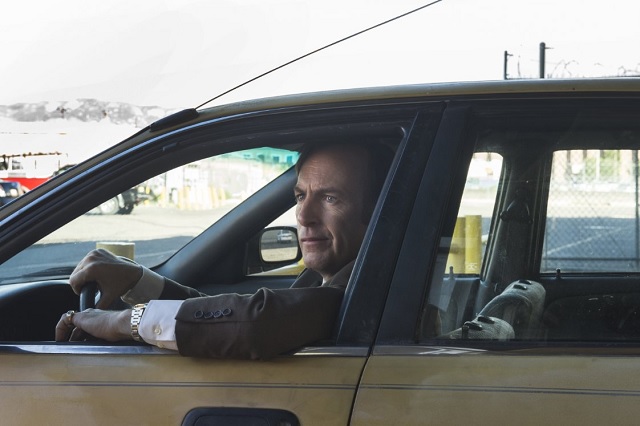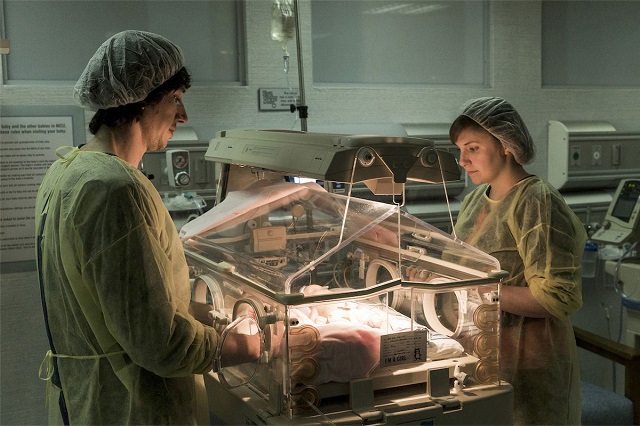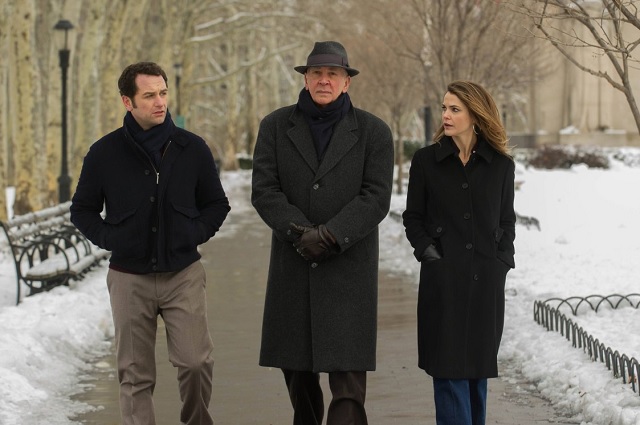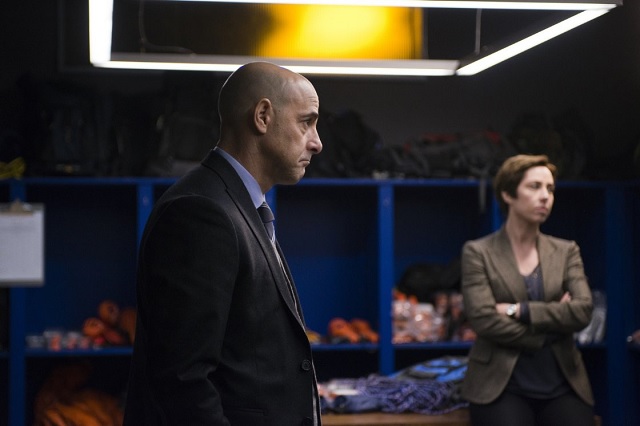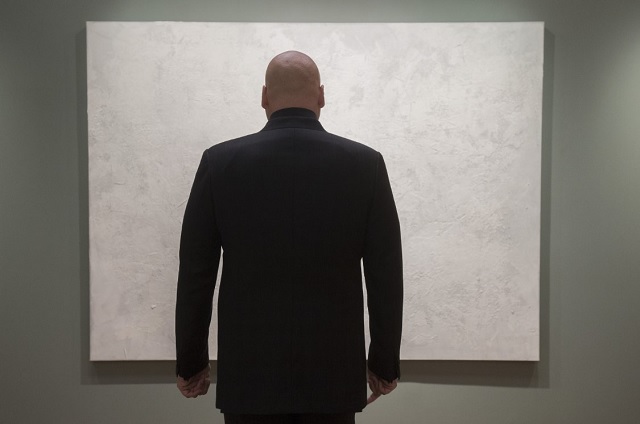Back to Part 1 of the Best TV Episodes of 2015 (So Far)
Man Seeking Woman, “Teacup”
Written by Sofia Alvarez
Directed by Tim Kirkby
Aired March 11th, 2015 on FXX
You won’t find FXX’s Man Seeking Woman in many year-end discussions, but over the course of its admittedly spotty, watched-by-no-one first season, it staked a claim on some truly unique stylistic real estate in a landscape previously thought to be worked to death: the search for love. Over the last year, there has been a tremendous influx in the number of series trying to combine a “modern” and “edgy” take on modern courtship with ages-old sitcom tropes, but most of these have ranged from lackluster to outright lame. (See almost the entire new network comedy lineup, Fall/Winter 2014-15.) Creator Simon Rich’s vision of the dating world as a literal fantasy hellscape—complete with demonic destination weddings, time travel, and Hitler—showed frequent promise and had some dynamite gags (aided by the relentlessly likable Jay Baruchel as lovesick sad-sack Josh), but was sometimes hampered by tortured, regressive gender politics, difficulties only somewhat leavened by its sense of self-awareness. “Teacup” gender-flips the series’ premise—the intro literally changes the title to Woman Seeking Man—to follow the trials of Josh’s sister Liz (a fantastic Britt Lower), whose own difficulties in the dating world make Josh’s seem quaint by comparison. The resulting episode is by far the season’s best, not only because it provides a respite from the sometimes wearisome Josh, but because it proves that Man Seeking Woman has the capacity to balance its magic-realist approach with story and character beats that resonate deeply for anyone attuned to the vagaries of modern courtship. “Teacup” remembers that hilarity and heartbreak can be very potent scene partners. [Simon H]
Better Call Saul, “Bingo”
Written by Gennifer Hutchison
Directed by Larysa Kondracki
Aired March 16th, 2015 on AMC
When AMC announced Better Call Saul some time ago, virtually everyone was at least a little apprehensive; sure, Breaking Bad was swell and all, but wouldn’t it be nice to see the show’s creatives go somewhere totally new? As it turns out, those creatives (including Saul Goodman’s creator, Peter Gould) agreed, and Saul turned out to be very much its own beast, one indebted more to ’70s American-auteur filmmaking than the bleeding-edge storytelling of the series that originated it. Part of that stylistic decision is a reflection of Saul himself: he came of age in the time of Cimino, Lumet, and Altman, and many episodes feature quotes and homages to the pop-culture era that Saul most closely associates with. Appropriately, “Bingo” (just one of a half-dozen stellar episodes in the series’ remarkably strong debut season) climaxes with an extended sequence that doubles as an homage to classic works of dramatic showboating like the monologues from Paddy Chayefsky’s screenplay for Network. Bob Odenkirk proves more than able to find the gravitas necessary to carry off the epic rant and Kondracki’s meticulous direction—along with the typically incredible editing and cinematography courtesy of the same technical crew from that revolutionized TV aesthetics on Breaking Bad—matches his energy, making for a hilarious, biting showstopper every bit the equal of its forebears. [Simon H]
Girls, “Home Birth”
Written by Jenni Konner & Lena Dunham & Judd Apatow
Directed by Lena Dunham
Aired March 22nd, 2015 on HBO
After a disappointing fourth season (at least in the point of view of this writer), Girls ends with one of the best episodes of the series yet. “Home Birth” could very well have been the final episode of the series, let alone the season, with so many major life plans changing in such a short period of time. While Caroline’s home birth serves as the comedic focal point (you got to love how Jessa ducks her head into the bathwater to get a closeup of the action), “Home Birth” is ultimately one of the series’ most mature installments to date, with all four titular young women asserting their independence in ways that we’ve so often longed for them to display. “Nowhere to grow up but up” reads the promotional tagline for the fourth season of Girls, and in many ways the girls do just that. Perhaps what makes this episode feel so final is how all four women demonstrate an ability to break out of the habits that have derailed their lives for so long. It’ll be interesting to see if it lasts. [Ricky D]
The Americans, “Do Mail Robots Dream of Electric Sheep?”
Written by Joshua Brand
Directed by Stephen Williams
Aired March 25th, 2015 on FX
During a busy third season, The Americans strikes pure gold in the form of Lois Smith. Smith’s performance as Betty Turner in “Do Mail Robots Dream of Electric Sheep?” is easily in early contention for the year’s finest guest role. In the midst of a standard operation for the Jenningses, Elizabeth runs into Betty, allowing the episode to settle into a conversation about life, death, and the purpose of both. The scenes between the two characters also remind viewers of the blunt indifference necessary in the life of a spy, something that can occasionally be lost in such an intricate plot. Other eventful moments populate the episode, such as Hans’ dismissal, an attempted coup staged by Stan and Oleg, and more development between Philip and Frank Langella’s Gabriel. But it’s ultimately the dialog and action with Elizabeth and Betty that propel the episode into such impressive and special territory, ripping out the hearts of viewers in the most painful of ways. [Sean C]
Fortitude, “Episode 10”
Written by Tom Butterworth & Chris Hurford
Directed by Nick Hurran
Aired March 26th, 2015 on Pivot
Ever heard of Pivot TV? Most people hadn’t until Fortitude, the channel’s first scripted series (co-produced with Sky), debuted, introducing viewers to the icy, desolate purgatory of Fortitude, the only town where it’s cold enough that disease can fester in ancient mammoth fossils and the 800+ members of the town all carry automatic rifles. Cinematic, haunting, wildly engrossing… there are a lot of superlatives I could throw around to describe Fortitude, and “Episode 10” embodies each and every one of them, a critical turning point in the show’s fascinating debut season.
Centered around a climatic conversation between DCI Morton (Stanley Tucci) and poor old Henry (Michael Gambon), “Episode 10” is the definitive mark for when everything in the icy town of Fortitude completely goes to hell. Buoyed by Nick Hurran’s masterful direction, “Episode 10” doubles down on the psychological horrors instituted in the show’s earliest hours, painting the town’s sherriff and mayor into untenable positions and watching them flail around for answers while Morton and Henry’s friendship comes to a halt in the middle of nowhere. More importantly, “Episode 10” uses that climatic conversation as a key revelation to the first season, a revelation that ultimately lies only with the audience, but one of Fortitude‘s many masterful dramatic strokes throughout a first season that stands next to Hannibal as the strongest freshman campaigns in recent memory. [Randy D.]
Last Week Tonight, Season 2, Episode 8
Guest: Edward Snowden
Aired April 5th, 2015 on HBO
Anyone paying close attention to the HBO schedule on the Sunday that brought this episode of Last Week Tonight noticed that the show was taking up 45 minutes, as opposed to its usual half-hour. Given that the structure of Last Week Tonight is very strongly defined by now—smaller, unrelated topical gags followed by a longer monologue/investigative piece that takes up the bulk of the program—the overanalytical types might well have assumed that John Oliver had something special up his sleeve. In one of the few surprise TV coups of 2015 that actually delivered, these suspicious were rewarded: Oliver scored a face-to-face interview with Edward Snowden, the infamous NSA whistleblower currently wanted by the US government. The extended, wide-ranging interview dives deeper into the ethics of Snowden’s actions, the efforts made to keep the leaks in the “right” hands, and Snowden’s ultimate legacy than perhaps any other piece of popular journalism. That Oliver was able to pull this off while also finding a rich vein of comic inquiry by tapping into the apparently very profound mass fear of strangers being able to download one’s “junk” is merely icing on an episode that managed to be both deeply important and supremely entertaining. [Simon H]
Daredevil, “Shadows in the Glass”
Written by Steven S. DeKnight
Directed by Stephen Surjik
Released April 10th, 2015 by Netflix
The first season of Marvel’s new series Daredevil quickly rose up the ranks, with one of its strengths being the time it spent developing primary antagonist Wilson Fisk, adding depth and dimension to the character to blur the line between good and evil in a fascinating way. The best example of this was in the Fisk-centric episode “Shadows in the Glass”. Not only does “Shadows in the Glass” do an excellent job of adding poignant context to what had seemed to be a throwaway moment with a painting in an earlier episode, it also provides a great look into Fisk’s insight and his influences. The reflection in the mirror comes as a genuine shock, and at no point during the flashbacks do the writers draw specific attention to either of Fisk’s parents, instead relying on the audience to understand and draw the parallels between the way his father and mother act in his childhood and the way Fisk acts now. The cinematography and music add to the effect, resulting in one of the top episodes of television in the year to date. [Deepayan S]
Silicon Valley, “Sand Hill Shuffle”
Written by Clay Tarver
Directed by Mike Judge
Aired April 12th, 2015 on HBO
Midway through filming season one of Silicon Valley, series standout Christopher Evan Welch died, leaving the show in a difficult narrative position. In its second season premiere, Silicon Valley addressed this, writing the character out with a beautiful blend of reverence and cheek, having him die under mysterious circumstances while on safari. Monica details the events leading to the character’s death to Richard and Erlich in one of the series’ funniest scenes to date, Amanda Crew delivering each increasingly ridiculous sentence of Monica’s description with somber gravity. The funeral that follows is equally entertaining and the fallout, which eventually leads to Erlich finally using his superpower of negging for good, rather than evil, builds wonderfully to the episode’s surprising, but energizing ending. Silicon Valley had a strong first season, but it came back even better in season two, bursting from the gate with one of the best episodes of the year. [Kate K]
Continue to Part 3 for more of the Best TV Episodes of 2015 (So Far)

